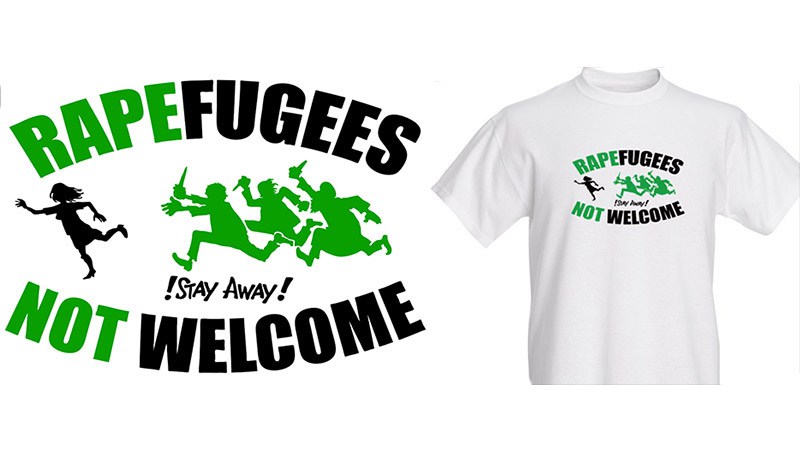Sexual harassment, Islam and the politicisation of women’s bodies
By Khaled Diab
Sexual harassment in Cologne and elsewhere is not about Islam. It is about the patriarchy and the politicisation of women's bodies.

Tuesday 26 January 2016
Charlie Hebdo ran a cartoon in its latest issue featuring the drowned Syrian child Aylan Kurdi, in which it suggests that, had he lived, the boy would have morphed into a man-ape and become an “ass groper”. This was a crude reference to the shocking spate of robberies and mass sexual assaults of women in Cologne on new year's eve, which has further fuelled anti-migrant and anti-refugee sentiment across Europe.
Defenders of the cartoon claim it is a parody that “mirrors racist public discourse” and a “damning indictment of our anti-refugee sentiment.”
As someone who is no stranger to satire and who was outraged by the slaying of Charlie Hebdo staff by Islamist terrorists, I feel these defences give the satirical French magazine too much credit. Even if we were to give it the benefit of the doubt, racists and bigots are likely to take the cartoon – which echoes traditional depictions of blacks as oversexed monkeys – at face value, and use it to confirm their prejudices.
Rather than challenging the growing anti-refugee sentiment, I feel Charlie Hebdo is pandering to it. Social media in Germany and across Europe has been awash with a tidal wave of hate speech against migrants since the Cologne mob attacks, as epitomised by the grotesquely racist “rapeugees” hashtag and the call on Facebook for a “manhunt of foreigners”, which has already claimed casualties.
That is not to say that I do not feel outraged by what happened in Cologne on new year's eve. So far, nearly 350 women have reported being sexually assaulted by roaming mobs of drunken men, many of whom were described as looking Arab or North African.
The scale and mob nature of these attacks reminds me of Tahrir square, where groups of men would erect a “circle of hell” around female protesters and sexually assault them.
Although a large number of these savage attacks were likely opportunistic, exploiting the confusion of big crowds and the vulnerability of women inside them, others were politically motivated.
Victims accounts and circumstantial evidence suggest that many were likely carried out by the regime's paid thugs or undercover police to intimidate female protesters, by the Muslim Brotherhood, and other Islamists, who have a track record of inciting against female protesters, incensed by women acting as equals and demanding equality.
The reactions to these crimes have more often than not also been politicised, with Egyptian society's most reactionary forces, from the military to the Muslim Brotherhood, trying to capitalise on these tragedies by blaming their political opponents for them.
A similar dynamic has been at play in Germany. The apparently orchestrated nature of the sexual assaults in Cologne suggests that they may have been politically motivated, though for what end or by whom is a mystery.
As if the sexual abuse of the women in Cologne was not enough, anti-Muslim and anti-immigrant groups and politicians have been falling over themselves to politicize their plight.
This political profiteering was on blatant display during a rally organised by the anti-Islam Pegida (Patriotic Europeans Against the Islamisation of the Occident).
“This is Deutschland, not Afghanistan,” opined Tommy Robinson, the former leader of the extremist English Defence League and founder of the European Defence League. “Islam is the cancer and Pegida is the cure.”
What exactly sexual assault and sexual harassment have to do with Islam – or at least any more so than other religions – is unclear. Syrian refugees, for one, do not seem to have read the memo. A group of them produced a flyer addressed to the German public, in which they declaimed: “Our cultural values were trampled by these crimes. Those values include respect for women and men [and] respect for bodily integrity.”
On new year's eve, one American woman in Cologne was rescued from a mob attempting to assault her by a group of Syrian refugees who set up a protective cordon around her and helped her locate her boyfriend. “The good people, nobody speaks about them,” one of the young woman's rescuers lamented.
If Islam really were to blame for the Cologne assaults, then you'd expect there to be a clear pattern of sexual harassment across the Arab and Muslim world. But anecdotal evidence suggests that no such pattern exists.
An unscientific survey I conducted of female friends and acquaintances confirmed Egypt and Pakistan as among the worst in the Muslim world, and India topped the non-Muslim league. Meanwhile, the Levant, including Syria before the civil war, was seen as pretty mellow. “I feel a lot more comfortable around 11pm in Manger Square… than I do walking in Cairo during broad daylight,” one friend confessed.
In Egypt, the sexual harassment epidemic is partly a backlash against the gender revolution taking place, in which women are becoming more assertive and unapologetic in their demands for equality, as well as years of denial and the breakdown in law and order.
Interestingly, women living in some Gulf states, such as the UAE and Bahrain, report that the harassment there is minimal. Given their conservative reputation, this would appear to be an anomaly.
However, this conservatism may be part of the reason why their streets are relatively free of sexual harassment. There, the traditional concept of a woman's “honour” being intertwined with that of her family is still robust. So, rather than gender equality, it is the idea that a woman is some man's sister, daughter or even mother that holds other men back.
Although less common, this attitude is not unfamiliar in the West. This was demonstrated at the Pegida rally. Not only were the majority of the protesters there men, Tommy Robinson reminded his audience that: “It is the duty of every man to protect their women.”
“When exactly those people who otherwise spend the year telling women that they should button up their blouses suddenly start promoting women's rights, then it is instrumentalized racism,” wrote Sascha Lobo in Der Spiegel.
Much as we would like to believe that we, in the West, live in some kind of post-patriarchal society of equals, misogyny remains, persistently and infuriatingly, alive and well. And despite all the gender legislation and education, sexual harassment in public is a reality that millions of women on both sides of the Atlantic must live with.
“The place where I have been most harassed is France by non-Arab men,” one well-travelled friend admitted. Another said that harassment was less frequent in Europe than in the Middle East but when it occurred it was “more aggressive or very rude… Harassers have pretty often seemed drunk or high.”
What limited research has been conducted reveals that street harassment is a challenge of global proportions. One study in the United States found that a whopping 87% of American women had been sexually harassed, with half reporting “extreme” harassment. A Europe-wide survey found that one in three women had experienced physical or sexual abuse, with one in 20 reporting they had been raped.
The assaults in Cologne were an extreme and discomfiting public display of this reality, and singling out migrants will not resolve the problem. In addition to better policing, Europeans need to tackle the misogyny and sexism, both amongst minorities and the majority, that give men a sense of entitlement to women's bodies, breed a blame-the-victim culture and provide victims with insufficient emotional and legal support.
____
Follow Khaled Diab on Twitter.
This article first appeared in Haaretz on 20 January 2016.



Hey, Khaled! I just had the opportunity of demonstrating your non-existent honesty on the Al-Jazeera website (remember the tiny .04% number that works out to 17,600 murders, robbers, rapists and foul smelling life forms?). And that website led me to this little rat’s nest where I will enjoy spending all my spare time. One of your flights of fantasy, “Sexual harassment, Islam and the politicization [sic] of women’s bodies,” By Khaled Diab, (Tuesday 26 January 2016) goes a long way to deflect by blaming the Cologne gang rapes on everything but the scum that committed it.
Your attack of word processor diarrhea laments the little boy cartoon as evidence of “echoes [of] traditional depictions of blacks as oversexed monkeys.” No, shit head, it laments the proclivity of lower life forms showing gratitude to their benefactors the only way they know. And most people I know see Arab Muslims and Africans as two separate segments of the human family. The Black part of our family is welcome in the brotherhood of man; the Arab Muslim part is not.
You posit “only” 350 claims of Muslim-related sexual assault from European women. You neglect to mention they all resulted from one night’s celebration. But since the mob rapes seemed to resemble Tahir Square’s Circle of Hell against female protesters, they’re just “boys having fun.” Again, you neglect to remind your readers that one of those Circle of Hell victims was an American reporter for CBS, Lara Logan who shared the joy with a second young Dutch journalist so traumatized they won’t release her name. Go to http://www.clarionproject.org /news/ journalist-gang-raped-tahrir-square-during-egypt-protests, in case you need to research it a little bit. Take a look at the wall graffiti and when you get around to it, let us know what the words mean. I think I get the pictures.
And no, you can’t shift blame here by speculating the attacks were politically motivated by the Muslim Brotherhood or any other political entity. These horrific assaults came straight from a culture that has acted this way since Mo-Hamma-Lamma-Ding Dong hid in a cave and wrote the Koran. And, yes, PEGIDA is the European answer to Muslim scum. While here, in America’s West, our organization is known as the Hells Angels. And we’re looking forward to your rape gangs real bad, Khaled. The relationship will be short.
At this point in your ridiculous essay you slip into typical Muslim discourse. You throw as much shit on the wall as possible in order to prohibit a point by point refutation. This Arab tactic gives the challenged an opportunity to point at what his superior, intellectually gifted opponent missed, thereby giving an excuse to claim the entire argument is false.
It won’t work, Khaled. Your defense of the indefensible is unfortunate and judging from a displayed ability to conjugate, sad.
Now, will you send me one of those “Rapugee” shirts? I wear 5-XLT.